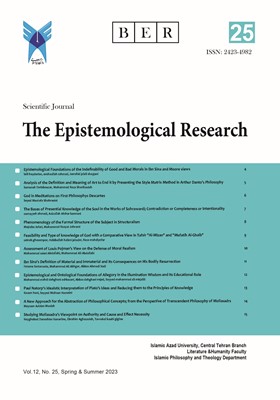Paul Natorp’s Idealstic Interpretation of Plato’s Ideas and Reducing them to the Principles of Knowledge
Subject Areas : Epistemological researches
kazem hani
1
*
![]() ,
Seyyed Mohsen Hosseini
2
,
Seyyed Mohsen Hosseini
2
![]()
1 - PhD of Philosophy. Allameh Tabataba'i University. Tehran. Iran.
2 - Ph.D. Candidate in Philosophy and Islamic Theology. Shahid Rajaee Teacher Training University. Tehran. Iran.
Keywords: reduction, Law, Plato, Idea, Natorp,
Abstract :
Plato’s doctrine of Ideas can be considered as the center of his philosophy. From Plato’s viewpoint, Ideas form the essence of sensible things. The Ideas are condition of both the existence of sensible things and their recognition. According to the problem he was facing, Natorp returned to Plato's ideas. Natorp's problem is the invalidation of philosophy and the baselessness of science. He tries to determine the relationship between philosophy and different sciences in order to give credit to philosophy and clarify the logic of governing sciences. To achieve the above two goals, Natorp takes help from Plato's ideas and presents a transcendental and epistemological interpretation of them. Because in his opinion, philosophy only as epistemology is valid. So, Natorp believes that Plato’s Ideas cannot be considered as fixed entities and separated from the sensible world, but they should be considered as transcendental conditions of the actualization of reality. Ideas are laws or explanations that are posited in thought in the first place and then the reality derived from their nature. Now, considering this introduction, some important issues arise: Do Plato's ideas have a purely epistemological function? What is the relationship between Natorp's law and Plato's ideas? This article, with a descriptive-analytical method, while examining Natorp's interpretation, tries to explain that Plato's ideas do not only have an epistemological function, but their ontological and moral aspects are also important.
ارسطو. (1378). اخلاق نیکوماخوس، ترجمه محمدحسن لطفی، تهران، طرح نو، چاپ اول.
همو. (1389). متافیزیک، ترجمه شرفالدین خراسانی، تهران، حکمت، چاپ پنجم.
افلاطون. (1380). دورۀ کامل آثار افلاطون، ترجمه محمدحسن لطفی، 4 جلد، تهران، خوارزمی، چاپ سوم.
تیلور، کریستوفر چارلز ویستن. (1392). تاریخ فلسفه غرب: از آغاز تا افلاطون، ترجمه حسن فتحی، جلد 1، تهران، حکمت، چاپ اول.
هارتناک، یوستوس. (1387). نظریۀ معرفت در فلسفۀ کانت، ترجمه غلامعلی حداد عادل، تهران، هرمس، چاپ اول.
Beiser. Frederick. (2014). The Geniesis of Neo-kantianism, 1796-1880, Oxford University Press.
Beiser. Frederick. (2015). The Handbook of German Philosophy in the Nineteenth Century, Edited by Michael N. Forster and Kristin Gjesdal.
Cherniss, H. F. (1944). Aristotle’s Criticism of Plato and the Academy, Baltimore, John Hopkins University.
Gadamer. H-G. (1980). Dialogue and Dialectic: Eight Hermeneutical Studies on Plato, Translated and with an introduction by p. Christopher Smith, New haven and London, Yale university press.
Gadamer. H-G. (1991). Plato’s Dialectical Ethics, Translated and with an introduction by Robert M. Wallace, New haven and London, Yale university press.
Heidegger, M. (1997). Plato’s Sophist, Translated by Richard rojcewicz and andre schuwer, Indiana university press.
Kant. Immanuel. (1998). The Critique Of Pure Reason, Translated by Paul Gayer and Allen W. Wood, Cambridge University Press.
Kim. Alan. (2010). Plato in Germany: Kant-Natorp-Heidegger, Academia Verlga.
Lask. Anndre. (2004). “Plato Between Cohen and Natorp: Aspects of neo-Kantian Interpretation of The Platonic Ideas”, In Natorp. Paul. Plato’s Theory of Idea: An introduction to Idealism. Edited With An Introduction by Vasilis Politis, Translation by Vasilis Politis and John Connolly, Academia Verlga. 453-483.
Natorp. Paul. (2004). Plato’s Theory of Idea: An introduction to Idealism, Edited With An Introduction by Vasilis Politis, Translation by Vasilis Politis and John Connolly, Academia Verlga.
Natorp. Paul. (2015). “On the Objective and Subjective Grounding of Knowledge”, In Luft Sebastian (ed), The Neo-Kantian Reader. Routledge. 164-179.
Poma. Anderea. (1997). The Critical Philosophy of Hermann Cohen, Translated by John Denton, State University of New York Press.
Zuckert. C. H. (1996). Postmodern Plato’s: Nietzsche, Heidegger, Gadamer, Strauss, Derrida, The University of Chicago Press.
_||_
